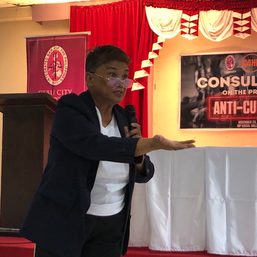SUMMARY
This is AI generated summarization, which may have errors. For context, always refer to the full article.

MANILA, Philippines – What do vice presidential bets have to say about issues concerning women?
Filipinos are given 6 choices: Senators Alan Peter Cayetano, Francis Escudero, Gregorio Honasan, Ferdinand Marcos Jr, and Antonio Trillanes IV, and Representative Leni Robredo.
Whoever wins would have to work alongside the president. Do their stand on reproductive health (RH), divorce, abortion, and LGBT (lesbian, gay, bisexual, transgender) rights match or clash?
Here’s a quick rundown:
|
Stand of 2016 vice-presidential bets on the Reproductive Health Law |
|
| Candidate | Stand on RH law |
| Cayetano | Yes |
| Escudero | Yes |
| Honasan | No |
| Marcos | Yes |
| Robredo | Yes |
| Trillanes | No |
Men against RH
Of all the VP bets, only Trillanes and Honasan are against the RH law.
The two were among the 8 senators who voted against the RH bill in December 2012. They were joined by Juan Ponce Enrile, Ramon Revilla Jr, Vicente Sotto III, Aquilino Pimentel III, Jinggoy Estrada, and Manuel Villar.
In a speech delivered to students of the University of Asia and the Pacific in 2013, Trillanes stressed his opposition to the RH law, especially its provisions on “sex education.”
The senator claimed that RH law authors want to use curricula from Western countries, with “graphic materials depicting conjugal relations and a mentality of using contraceptives.”
Trillanes’ understanding of sexuality education, however, is different from what the RH law actually promotes.
The law focuses on “age-and-development-appropriate” reproductive health education for adolescents taught by “adequately trained teachers.”
This includes values formation, knowledge, and skills in self-protection against teenage pregnancy, discrimination, sexual abuse, violence against women and children (VAWC), and other forms of gender-based violence.
Lessons also explain the physical, social, and emotional changes among adolescents; rights of women and children, responsible teenage behavior; gender and development; and responsible parenthood.
Trillanes’ interpretation is similar to that of the Catholic Bishops Conference of the Philippines (CBCP), which believes that sexuality education “should not go into too much details.”
“Don’t have to teach intercourse or [artificial] contraceptives, but we can teach natural family planning,” Fr Dave Clay of the CBCP Commission on Family and Life told Rappler earlier. (READ: God, sex, babies)
Trillanes also argued that a “business interest” is behind the RH law, involving billions of taxpayer money.
In January, however, the Department of Budget and Management clarified that there are enough funds in the 2016 budget for the implementation of the RH law. Its funds are sourced from:
- The 2015 budget of the Department of Health’s Family Health and Responsible Parenting (FHRP) program
- Appropriation of FHRP in the 2016 budget
- Savings from the 2015 budget
Likewise, Honasan is against the RH law, saying population density is not the cause of poverty. He supports any move to repeal the law.
Both senators were supported by the Diocese of Bacolod in 2013, placing them under the so-called “Team Buhay” composed of “pro-life” candidates.
Pro-RH

Meanwhile, pro-RH candidates were tagged as “Team Patay“, leaving a bitter taste on some voters’ mouths.
Such labels, however, did not hinder pro-RH candidates from winning and the RH bill from passing into law.
Escudero voted in favor of the RH law, saying he wants “each and every newborn Filipino to be a given fair and equal chance to uplift and improve their lives.”
Meanwhile, Cayetano stressed that the RH law does not promote abortion, promiscuity, teenage sex and pregnancy. Instead, the law aims to prevent and address such issues.
Unlike his mother Imelda, the young Marcos supports the RH law.
“[A]fter being witness to the agony and hardship of young women and men, when they find themselves in a situation they’re ill-prepared and often ignorant of. We must do something for them,” Marcos said in defense of the RH law.
Marcos also authored a version of the RH bill during his stint as Ilocos Norte congressman.
As for Robredo, she wants to “fully implement the RH Law to alleviate poverty and overpopulation in the country.”
In March, a group of RH advocates endorsed Robredo, lauding her as a “lawmaker who walks the talk.” Aside from supporting the RH law, Robredo also promotes women’s economic empowerment.
Perfect match?
Of the 5 presidential bets, only Vice President Jejomar Binay maintains a rather vague stand on the RH law.
Senator Grace Poe, Senator Miriam Defensor Santiago, Davao City Mayor Rodrigo Duterte, and Mar Roxas are all in support of the legislation. (READ: Presidential bets on RH, divorce, LGBT)
Earlier this year, two years after the RH law was declared constitutional by the Supreme Court, RH advocates are once again challenged.
The removal of the P1-billion allocation for contraceptives in the 2016 budget should be an election issue, advocates say, adding that the fate of the RH law depends on the kind of leaders Filipinos elect in May.
An ideal pairing would be president and a vice president who both support the RH law, advocates say.
Another possible combination is a clashing pair. But what advocates fear the most is a tandem that could potentially thwart an effective implementation of the RH law. – Rappler.com
Add a comment
How does this make you feel?







There are no comments yet. Add your comment to start the conversation.